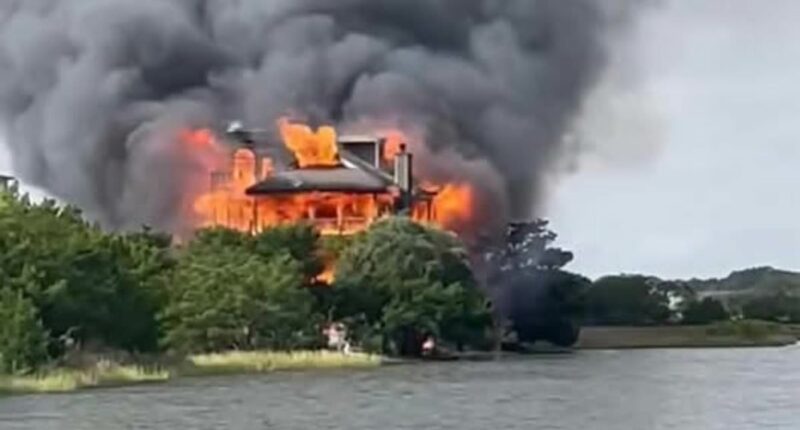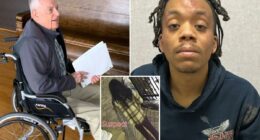Share this @internewscast.com
A South Carolina judge whose beachfront property burned to the ground in a possible arson attack on Saturday had issued a decisive ruling against the Trump administration just weeks earlier.
Diane Goodstein, 69, saw her sprawling $1.5 million home go up in flames on Edisto Beach as her family, including her ex-senator husband Arnold Goodstein, were rushed to hospital.
Authorities are now working to determine what may have caused the four-bedroom, four bath home to go up in smoke.
But sources have said the circuit court judge has received death threats over the past few weeks following her controversial decision to prevent the state from handing over sensitive voter registration documents to the federal government.
Trump’s Department of Justice had requested South Carolina officials turn over the personal data of more than 3.3 million voters, including names, addresses, birthdates, driver’s license numbers and the last four digits of their Social Security numbers, according to the Economic Times.
The administration would then compare the data to a different database, maintained by the Department of Homeland Security to see how many registered voters on the list match up with noncitizens listed by immigration agents, The New York Times reports.
One South Carolinian voter Anne Crook attempted to halt the process by filing a lawsuit against the South Carolina Elections Commission – and on September 2, Goodstein issued a temporary restraining order in the case, halting the hand over of voter information.
She wrote in her brief ruling that ‘there is a likelihood that immediate and irreparable damage will result to Plaintiff if her personal information data is released in violation of her right to privacy,’ according to court documents obtained by WRDW.

South Carolina Circuit Court Judge Diane Goodstein issued a decisive ruling against the Trump administration last month

The decision put her on a collision course with the Trump administration and South Carolina Gov. Henry McMaster

Weeks later, Goodstein’s $1.5 million beachfront property burned to the ground
The decision put Goodstein at odds with both the Trump administration and South Carolina GOP Gov. Henry McMaster, who filed an emergency petition to appeal the lawsuit and the temporary restraining order on September 5.
McMaster argued that Crook’s case was ‘unlikely to succeed on the merits’ that were cited in the lawsuit and said that denying his petition would be a ‘miscarriage of justice.’
‘Whatever Crook or anyone else thinks of DOJ’s request, the way the circuit court tried to stop the Commission is wrong,’ the governor hit out at Goodstein.
He went on to argue that Goodstein failed to explain whether she believed the lawsuit was likely to succeed, which is required for a court to intervene, as he tore apart Cook’s arguments.
‘Beyond the legal arguments, appreciate what Crook really says: The State cannot give the last four digits of her Social Security number to the federal government.
‘But the federal government already has Crook’s full Social Security number (as well as every other South Carolinian’s) because the federal government issues those Social Security numbers,’ the governor argued.
‘It’s untenable (to put it mildly) to insist that the State cannot tell the federal government something that the federal government already knows.’
McMaster concluded by arguing it could be detrimental for the state to ignore the Department of Justice’s request – as its order suggested that any state that fails to comply could face lawsuits or lose state funding.
‘Lawsuits against the federal government are not minor affairs and the drain on the State’s resources (in time, talent and treasure) would be substantial,’ the governor lamented.

Trump’s Department of Justice had requested South Carolina officials turn over the personal data of more than 3.3 million voters

The federal government requested the voters’ names, addresses, birthdates, driver’s license numbers and the last four digits of their Social Security numbers. Election officials are pictured checking in voters in Columbia, South Carolina in February 2024
‘(In fact, the taxpayers would be paying for both sides of that case),’ he pointed out.
The State Supreme Court ultimately sided with the governor, overturning Goodstein’s temporary restraining order in a six-page opinion on September 11.
The opinion criticized Goodstein for failing to detail what kind of damage would be caused in the release of personal information of voters.
It also noted that Goodstein ordered the Election Commission not to comply with the request for voter information before they had received notice of the lawsuit, which the court said was a violation.
Then, just days before Goodstein’s home was destroyed, another judge ruled that the state can continue handing over voter information to the federal government.

One woman sued to prevent the South Carolina Election Commission from turning over the data. South Carolinians are seen here casting their ballots in the 2024 presidential primary
‘The “right to privacy” constitutional provision does not encompass the sharing of data between the sate and the federal government to secure federal elections,’ Judge Daniel Cable ruled last Wednesday.
‘Federal law likely requires the Election Commission to provide the requested information to the DOJ.’
Following the ruling, interim director of the South Carolina Election Commission Jenny Wooten released a statement noting that ‘most of the information requested by the DOJ is already publicly available and may be purchased by any registered voter in South Carolina.
‘In addition, the SEC has previously entered into agreements with other states to share voter data for the purpose of maintaining accurate voter rolls and strengthening election security.’
Wooten then noted that any future decisions about sharing data with the Department of Justice will be made only by a public vote of the board.
In the meantime, the South Carolina Law Enforcement Division is working to determine whether the fire at Goodstein’s home on Saturday was an act of arson or if it was just an accident as they step up patrols and security in the area.
But South Carolina Chief Justice John Kittredge told FITSNews that the fire resulted from an ‘apparent explosion.’

Goodstein’s four-bedroom, four bath $1,155,200 home stretching up three stories went up in smoke at around 11.30am on Saturday

The South Carolina Law Enforcement Division is currently investigating the fire
‘Judge Goodstein was walking on the beach when the fire started,’ he said.
‘Her husband, Arnie, was in the house with children and perhaps grandchildren. The family had to escape by jumping from a window or balcony. I’m told there were injuries from the fall, such as broken legs,’ he said.
Of the three family members rushed to hospital, one was Goodstein’s husband Arnold – who reportedly leaped from the burning building after helping other family members escape.
‘Arnie’s injuries may have been the most serious, for he was airlifted to the hospital,’ Kittredge added.
Goodstein’s husband sustained multiple broken bones in his hips, legs and feet following the fall, the outlet reported.
Another of those hospitalized is said to be Goodstein’s son, Arnold Goodstein II.
His condition remains unclear.















